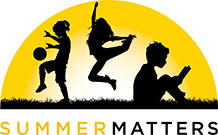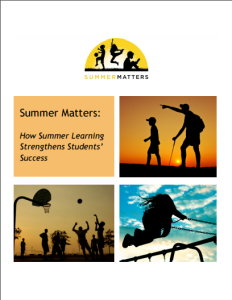Summer Matters
How Summer Learning Strengthens Students’ Success
Unequal access to summer learning and enrichment opportunities is a significant factor in the achievement gap between low-income students and their higher-income peers.
This study describes how summer learning programs that provide high quality, engaging enrichment activities are a promising solution to this challenge and can help to narrow our unacceptable achievement gap.
Executive Summary
This study examines the ways in which summer programs in three different parts of our state — Fresno, Sacramento and Los Angeles — benefited children and their families. The study addresses a gap in the existing literature on summer programs in California by examining the extent to which youth attending high quality, academically, socially and physically enriching summer programs demonstrate improved pro-social attachments, academic self-efficacy and motivation, and English Language Arts proficiency.
- In Los Angeles, LA’s BEST, a community-based organization, leads summer enrichment programs for children in elementary and middle school. Summer Matters sites use a set of thematically-based, week-long curricular units that incorporate hands-on activities that focus on building youths’ literacy skills.
- The Fresno Central Enrichment Summer Adventures (CESA) program is led by the Fresno County Office of Education at the Central Unified School District. Each summer, CESA focuses on a single book, organizing academic, enrichment, and recreational activities around the book’s characters and themes.
- The Summer of Service program in Sacramento is led by the District’s Youth Development Supportive Services office. Summer of Service programs utilize a service-learning model, with a goal of increasing youth’s school connectedness, understanding of civic responsibility, and engagement with their communities to support healthy lifestyles and environmental issues.
In the three Summer Matters communities profiled here, we find that youth made substantial improvements in their grade-level vocabulary skills, strengthened their connections to peers and adults, and sustained their academic habits and attitudes.
Improved Academic Efficacy and Sustained Academic Performance
- Participants ended the summer with vocabulary skills much closer to their grade level, increasing their Instructional grade level by over 1/3 of a grade on the San Diego Quick vocabulary assessment.
- English Learners across communities demonstrated statistically significant increases in their grade-level vocabulary skills, a gateway to English language fluency.
- Youth in Fresno and Los Angeles report increased academic work habits and reading efficacy, key contributors to academic achievement.
- Parents report that youth improved both their attitude towards reading (68%) and reading ability (62%).
Positive Relationships with Peers and Adults
- In Fresno, summer program participants were one-third less likely to be chronically absent in fall 2012 than their peers, indicating much greater engagement with school.
- Summer Matters participants demonstrated high and sustained school day attendance rates, which is critical for youth to succeed in school.
- In focus groups, parents report programs help youth prepare for the challenge of transitioning from elementary to middle school, a period when many youth begin to disengage from school.
- Nine out of ten parents report that the summer programs help their children to make new friends and get along better with other children. These social skills will help youth be more successful in school and beyond.
- Youth report that they have positive relationships with adults in the program and enjoy Summer Matters activities, reflecting the design of the programs.
Program Quality
- The quality of summer enrichment programs matters: youth who report high quality experiences in summer also report stronger work habits, reading efficacy, and social skills.
- Summer Matters programs are particularly good at providing engaging and interesting activities for youth while helping them to build strong, positive, relationships with peers and adults.
- Nearly all parents (98%) are satisfied with their children’s summer program.
Based on these findings, this report concludes that summer learning programs are helping to sustain and improve academic skills, build strong connections to peers and adults, and reinforce positive work habits and attitudes.




